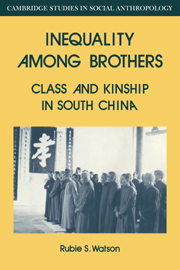Book contents
- Frontmatter
- Contents
- Preface
- Maps
- 1 Introduction
- 2 The development of the Teng lineage: Ha Tsuen's early history
- 3 Lineage organization and ideology
- 4 Economic organization: the land and the market
- 5 Local political organization
- 6 Class differences in Ha Tsuen: the social and cultural dimension
- 7 Marriage, affinity, and class
- 8 Economic and political changes: 1945–1978
- 9 Social and cultural transformations
- 10 Class and kinship
- References
- Glossary
- Index
- CAMBRIDGE STUDIES IN SOCIAL ANTHROPOLOGY
7 - Marriage, affinity, and class
Published online by Cambridge University Press: 30 October 2009
- Frontmatter
- Contents
- Preface
- Maps
- 1 Introduction
- 2 The development of the Teng lineage: Ha Tsuen's early history
- 3 Lineage organization and ideology
- 4 Economic organization: the land and the market
- 5 Local political organization
- 6 Class differences in Ha Tsuen: the social and cultural dimension
- 7 Marriage, affinity, and class
- 8 Economic and political changes: 1945–1978
- 9 Social and cultural transformations
- 10 Class and kinship
- References
- Glossary
- Index
- CAMBRIDGE STUDIES IN SOCIAL ANTHROPOLOGY
Summary
In earlier chapters I argued that notions of descent express many of the values and ideals of the Teng. For most villagers the lineage encompasses the known and trusted world, but the Teng cannot remain forever in this familiar environment. Because of surname exogamy, they must find wives outside the lineage. If descent expresses many of the Teng's cherished ideals, then affinity reflects some of their deepest fears and insecurities. Lineage members are bound together by their descent from a common set of ancestors. Those beyond the circle of agnation are “outsiders” (wai lai jen), to be treated with suspicion and calculation. For most Teng, marriage and affinity represent the unknown and the dangerous. What role do marriage and affinity play in a community where patrilineal descent is so marked? Are affines treated as enemies? Are married women expected to sever relations with their natal families?
While the economic and political world of the tenant farmer was largely circumscribed by the lineage, the world of the landlord-merchant extended well beyond the confines of Ha Tsuen. Considering the economic and social differences between Ha Tsuen's landlord-merchants and tenant farmers, it may not be surprising to learn that they also had different affinal relationships. Men from landlord-merchant families often had close ties to their affines, whereas men of tenant and small-holding families rarely had direct contact with their wives' kin.
- Type
- Chapter
- Information
- Inequality Among BrothersClass and Kinship in South China, pp. 117 - 136Publisher: Cambridge University PressPrint publication year: 1985



